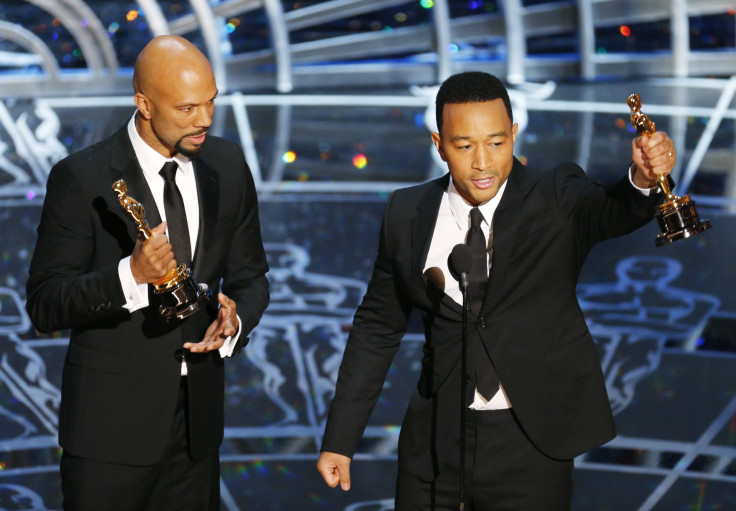Voting Rights Act 2015: John Legend's Academy Award Speech Lauded By Voter Advocates

Civil rights attorney Deborah Vagins didn’t catch this year’s Academy Award ceremony. But she knew something big had happened, as her email inbox was filled with notes from her colleagues about singer John Legend’s mention of the Voting Right Act during an acceptance speech Sunday night. “We know that the Voting Rights Act that they fought for 50 years ago is being compromised right now in this country,” Legend said as he and hip hop artist Common accepted a “best original song” Oscar for “Glory,” a musical tribute from the film, "Selma," addressing the struggle for federal legislation that removed barriers to voting booths for African-Americans in southern U.S. states
Vagins, along with other attorneys and activists, who are working with Congress to update the 1965 civil rights legislation, say Legend’s reference to a key provision that was struck down by the U.S. Supreme Court in 2013 couldn’t come at a more critical time for their effort. In a couple of weeks, Democrats and Republicans will be among the throngs of people expected to descend on Selma, Alabama, once ground-zero in the fight against race-based disenfranchisement, to mark the 50th anniversary of those fights. While congressional action on the VRA isn’t expected before the Selma commemorations, advocates believe restoration of the key voter protections can happen in the year of its golden anniversary -- if the public presses lawmakers to make it a priority.
“We feel that if people raise their voices, like John Legend and others, we can get this thing moving in Congress,” said Vagins, senior legislative counsel at the American Civil Liberties Union. “What he said is right -- the struggle for voting rights continues. We’re honoring Selma, but we need to fix [the VRA].”
The Voting Rights Amendment Act of 2015 would do that, advocates said. Introduced last week in the House of Representatives by Republican Rep. Jim Sensenbrenner of Wisconsin and Democratic Rep. John Conyers of Michigan, the new, updated VRA would restore some federal oversight of local voting laws for any state with voting rights violations as recent as 15 years ago. The legislation would also replace a public notice provision when voting laws change and establish a court remedy for challenges to changes, Vagins said.
Bob Goodlatte, the Republican chairman of the House Judiciary Committee, last Wednesday hinted that he would not schedule a committee hearing on the bill because “substantial” sections of the VRA remained in place after the Supreme Court’s decision. “We have not seen a process forward that is necessary because we believe the Voting Rights Act provided substantial protection in this area,” Goodlatte told reporters last month in Washington, D.C. John Merrill, Alabama’s Secretary of State, said earlier this month that he no longer felt his state, the epicenter of violent clashes that will be remembered next month, should still be subject to the VRA. “I say, at some point in time, you’ve got to forgive people, he said, adding that enough progress had been made for lawmakers to “move on” from the issue.
Reauthorization of the VRA had been required every five years since its passage, and was an overwhelmingly bipartisan effort, advocates said. However, some are worried that the 2013 Supreme Court decision emboldened states to enact voter changes and other barriers seen as discriminatory. Goodlatte and Merrill's comments seem to reflect a likelihood that new legislation would be a heavier lift than hopeful advocates and Democrats realize.
In Shelby County v. Holder, the Supreme Court case concerning the voting act, justices voted 5-4 to do away with sections of the VRA, including a requirement for states with a history of racial discrimination in voting to get federal clearance before making changes to local election laws. For instance, changing the location of a polling station or reducing the number of days for early voting for states such as Mississippi and Louisiana required federal approval. The formula used to determine which states were subject to the law had been based on data of 40-year-old voter rights violations, which the court believed was too old to apply to current day Alabama, where the case originated.
“The key provision has been missing for 20 months now… Municipalities have been free to implement changes that are discriminatory and, in some cases, have been,” said Leslie Proll, director of the Washington office of NAACP Legal Defense and Education Fund. Even before the Supreme Court’s decision, many voting rights advocates saw a surge of laws establishing photo identification requirements to cast ballots in the 2012 election. Such laws are a patchwork in the U.S., but more restrictive ID requirements in states including Wisconsin, Ohio and North Carolina have been seen to disproportionately impact minority voters, Proll said.
The Lawyers Committee for Civil Rights Under Law’s account of voting problems reported in the 2014 midterm election reveals a 45 percent increase over reports from the 2010 midterms. Concerns at polling places accounted for 61 percent of inquiries to the Lawyers Committee’s election protection hotline. Tanya Clay House, public policy director for the Lawyers Committee, said there was more than enough evidence to see why Congress needs to act on an updated VRA. “You have some of the same types of problems creeping up again,” Clay House said. “We should not allow this country to go back to where it was before Selma, because that’s essentially where we’re headed right now.”
© Copyright IBTimes 2024. All rights reserved.





















